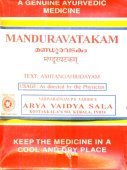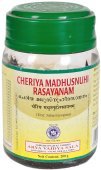Granthika, Granthīka, Gramthika: 17 definitions
Introduction:
Granthika means something in Hinduism, Sanskrit, Marathi, biology. If you want to know the exact meaning, history, etymology or English translation of this term then check out the descriptions on this page. Add your comment or reference to a book if you want to contribute to this summary article.
In Hinduism
Ayurveda (science of life)
Cikitsa (natural therapy and treatment for medical conditions)
Source: Wisdom Library: Ayurveda: CikitsaGranthika (ग्रन्थिक):—Another name for Pippalī (Piper longum), a species of medicinal plant and used in the treatment of fever (jvara), as described in the Jvaracikitsā (or “the treatment of fever”) which is part of the 7th-century Mādhavacikitsā, a Sanskrit classical work on Āyurveda.
Nighantu (Synonyms and Characteristics of Drugs and technical terms)
Source: WorldCat: Rāj nighaṇṭuGranthika (ग्रन्थिक) is another name for Pippalīmūla—(Cf. Pippalī), according to verse 6.21-23 of the 13th-century Raj Nighantu or Rājanighaṇṭu. The sixth chapter (pippalyādi-varga) of this book enumerates ninety-five varieties of plants obtained from the market (paṇyauṣadhi). Together with the names Granthika and Pippalīmūla, there are a total of fourteen Sanskrit synonyms identified for this plant.
Unclassified Ayurveda definitions
Source: Ancient Science of Life: Vaidyavallabha: An Authoritative Work on Ayurveda TherapeuticsGranthika (ग्रन्थिक) refers to Pippalimūla (Piper officinarum) and is the name of a medicinal plant dealt with in the 17th-century Vaidyavallabha written by Hastiruci.—The Vaidyavallabha is a work which deals with the treatment and useful for all 8 branches of Ayurveda. The text Vaidyavallabha has been designed based on the need of the period of the author, availability of drugs (viz., Granthika) during that time, disease manifesting in that era, socio-economical-cultural-familial-spiritual-aspects of that period Vaidyavallabha.

Āyurveda (आयुर्वेद, ayurveda) is a branch of Indian science dealing with medicine, herbalism, taxology, anatomy, surgery, alchemy and related topics. Traditional practice of Āyurveda in ancient India dates back to at least the first millenium BC. Literature is commonly written in Sanskrit using various poetic metres.
Purana and Itihasa (epic history)
Source: archive.org: Puranic EncyclopediaGranthika (ग्रन्थिक).—Name assumed by Nakula during his life incognito at the Virāṭa palace. (Virāṭa Parva, Chapter 3, Verse 4).

The Purana (पुराण, purāṇas) refers to Sanskrit literature preserving ancient India’s vast cultural history, including historical legends, religious ceremonies, various arts and sciences. The eighteen mahapuranas total over 400,000 shlokas (metrical couplets) and date to at least several centuries BCE.
Biology (plants and animals)
Source: Wisdom Library: Local Names of Plants and DrugsGranthika [ग्रन्थिक] in the Sanskrit language is the name of a plant identified with Capparis decidua (Forssk.) Edgew. from the Capparaceae (Caper) family. For the possible medicinal usage of granthika, you can check this page for potential sources and references, although be aware that any some or none of the side-effects may not be mentioned here, wether they be harmful or beneficial to health.
Granthika [গ্রন্থিকা] in the Bengali language is the name of a plant identified with Leonotis nepetifolia (L.) R.Br. from the Lamiaceae (Mint) family having the following synonyms: Phlomis nepetifolia.
Source: Google Books: CRC World Dictionary (Regional names)1) Granthika in India is the name of a plant defined with Artemisia vulgaris in various botanical sources. This page contains potential references in Ayurveda, modern medicine, and other folk traditions or local practices It has the synonym Artemisia opulenta Pampanini (among others).
2) Granthika is also identified with Leonotis nepetifolia It has the synonym Leonurus nepetifolius (L.) Mill. (etc.).
Example references for further research on medicinal uses or toxicity (see latin names for full list):
· Acta Facultatis Rerum Naturalium Universitatis Comenianae, Botanica (1974)
· Botaničeskij Žurnal (1810)
· Botaničeskij Žurnal (1975)
· Proceedings of the Indian Science Congress Association (1986)
· Fitologija (1986)
· Research Bulletin (1970)
If you are looking for specific details regarding Granthika, for example side effects, extract dosage, health benefits, diet and recipes, pregnancy safety, chemical composition, have a look at these references.

This sections includes definitions from the five kingdoms of living things: Animals, Plants, Fungi, Protists and Monera. It will include both the official binomial nomenclature (scientific names usually in Latin) as well as regional spellings and variants.
Languages of India and abroad
Marathi-English dictionary
Source: DDSA: The Molesworth Marathi and English Dictionarygrānthika (ग्रांथिक).—a S Relating to books; found in books; written. 2 Strung, filed, composed.
Marathi is an Indo-European language having over 70 million native speakers people in (predominantly) Maharashtra India. Marathi, like many other Indo-Aryan languages, evolved from early forms of Prakrit, which itself is a subset of Sanskrit, one of the most ancient languages of the world.
Sanskrit dictionary
Source: DDSA: The practical Sanskrit-English dictionaryGranthika (ग्रन्थिक).—1 An astrologer, a fortuneteller; ग्रन्थिकस्तु करीरे स्याद्दैवज्ञे गुग्गुलुद्रुमे (granthikastu karīre syāddaivajñe gugguludrume)' इति विश्वलोचनः (iti viśvalocanaḥ); Mahābhārata (Bombay) 14.7.7.
2) The name assumed by Nakula when at the palace of Virāṭa.
3) A kind of disease of the outer ear.
4) A Bamboo-shoot; L. D. B.
-kam 1 The plant Piper longum (Mar. gāṃṭhī piṃpaḷamūḷa).
2) The gum-resin (guggulu).
Derivable forms: granthikaḥ (ग्रन्थिकः).
--- OR ---
Granthīka (ग्रन्थीक).—The root of long pepper.
Derivable forms: granthīkam (ग्रन्थीकम्).
Source: Cologne Digital Sanskrit Dictionaries: Shabda-Sagara Sanskrit-English DictionaryGranthika (ग्रन्थिक).—m.
(-kaḥ) 1. An astrologer, a fortune teller. 2. The youngest of the Pandus. 3. A thorny plant: see karīra. n.
(-kaṃ) 1. The root of long pepper. 2. A kind of resin, Bdellium. 3. A perfume: see granthiparṇa. E. kan added to the preceding, or grantha a book, &c. and ṭhan aff.
--- OR ---
Granthīka (ग्रन्थीक).—n.
(-kaṃ) The root of long pepper: see granthika. pippalīmūle .
Source: Cologne Digital Sanskrit Dictionaries: Benfey Sanskrit-English DictionaryGranthika (ग्रन्थिक).—i. e. grantha + ika, I. m. 1. An astrologer, Mahābhārata 14, 2039. 2. A name of Nakula, the fourth son of Pāṇḍu, Mahābhārata 4, 63. 3. A disease of the ear, [Suśruta] 1, 59, 4. Ii. n. The root of long pepper, [Suśruta] 2, 208, 21.
Source: Cologne Digital Sanskrit Dictionaries: Cappeller Sanskrit-English DictionaryGranthika (ग्रन्थिक).—[masculine] relater, fortune-teller, astrologer.
Source: Cologne Digital Sanskrit Dictionaries: Monier-Williams Sanskrit-English Dictionary1) Granthika (ग्रन्थिक):—[from granth] m. a relater, narrator (?, ‘one who understands the joints or divisions of time, of the year, etc.’ [fr. granthi cf. kāla-granthi], an astrologer, fortune-teller, [cf. Lexicographers, esp. such as amarasiṃha, halāyudha, hemacandra, etc.]), [Mahābhārata xiv, 2039; Patañjali on Pāṇini 1-4, 29 and iii, 1, 26], [vArttika] 15
2) [v.s. ...] a kind of disease of the outer ear, [Suśruta]
3) [v.s. ...] a kind of plant or substance, [Caraka vi, 18]
4) [v.s. ...] a Name assumed by Nakula (when master of the horse to king Virāṭa), [Mahābhārata iv, 63 and 319]
5) [v.s. ...] = saha-deva, [cf. Lexicographers, esp. such as amarasiṃha, halāyudha, hemacandra, etc.]
6) [v.s. ...] mn. Capparis aphylla, [cf. Lexicographers, esp. such as amarasiṃha, halāyudha, hemacandra, etc.]
7) [v.s. ...] a kind of resin, bdellium, [cf. Lexicographers, esp. such as amarasiṃha, halāyudha, hemacandra, etc.]
8) [v.s. ...] n. = nthīka, pepper, [Suśruta iv, 37, 35; vi, 42, 23]
9) [v.s. ...] = nthiparṇaka, [cf. Lexicographers, esp. such as amarasiṃha, halāyudha, hemacandra, etc.]
10) [v.s. ...] a kind of disease of women, [Demetrius Galanos’s Lexiko: sanskritikes, anglikes, hellenikes]
11) Granthīka (ग्रन्थीक):—[from granth] n. the root of long pepper, [cf. Lexicographers, esp. such as amarasiṃha, halāyudha, hemacandra, etc.]
Source: Cologne Digital Sanskrit Dictionaries: Yates Sanskrit-English Dictionary1) Granthika (ग्रन्थिक):—(kaḥ) 1. m. An astrologer; youngest of the Pāndus; a thorny plant. n. Root of long-pepper; kind of resin or perfume.
2) Granthīka (ग्रन्थीक):—(kaṃ) 1. n. Root of long-pepper.
Source: DDSA: Paia-sadda-mahannavo; a comprehensive Prakrit Hindi dictionary (S)Granthika (ग्रन्थिक) in the Sanskrit language is related to the Prakrit word: Gaṃṭhiya.
[Sanskrit to German]
Sanskrit, also spelled संस्कृतम् (saṃskṛtam), is an ancient language of India commonly seen as the grandmother of the Indo-European language family (even English!). Closely allied with Prakrit and Pali, Sanskrit is more exhaustive in both grammar and terms and has the most extensive collection of literature in the world, greatly surpassing its sister-languages Greek and Latin.
Kannada-English dictionary
Source: Alar: Kannada-English corpusGraṃthika (ಗ್ರಂಥಿಕ):—
1) [noun] the root of the plant Piper chaba ( = P. officinarum) used for medicinal purpose.
2) [noun] a man who explains succinctly a passage of or whole of a book; a commentator.
--- OR ---
Grāṃthika (ಗ್ರಾಂಥಿಕ):—
1) [adjective] of or having to do with books or writing.
2) [adjective] characterised by the more formal, balanced, and polished language of literature rather than the informal language of speech.
Kannada is a Dravidian language (as opposed to the Indo-European language family) mainly spoken in the southwestern region of India.
See also (Relevant definitions)
Starts with: Gramthikatagara.
Ends with: Anghrigranthika, Bahugranthika, Mahagranthika, Nairgranthika, Nirgranthika, Sarvagranthika, Sarvvagranthika, Shadgranthika.
Full-text: Sarvagranthika, Damagranthi, Gamthiya, Kintikam, Pippalimula, Mahagranthika, Kancani, Shadushana, Cavya, Nirgranthika, Pala, Pippali.
Relevant text
Search found 9 books and stories containing Granthika, Grānthika, Granthīka, Gramthika, Graṃthika, Grāṃthika; (plurals include: Granthikas, Grānthikas, Granthīkas, Gramthikas, Graṃthikas, Grāṃthikas). You can also click to the full overview containing English textual excerpts. Below are direct links for the most relevant articles:
The Garuda Purana (by Manmatha Nath Dutt)
Chapter CCXI - Medical treatment of cuts, wounds, scalds, burns, etc. < [Dhanvantari Samhita]
Chapter CCXVII - Various Recipes for the cure of sterility, virile impotency, etc. < [Dhanvantari Samhita]
Chapter CCXXVII - Different names of the Ayurvedic Drugs < [Dhanvantari Samhita]
Mahabharata (English) (by Kisari Mohan Ganguli)
Section XII < [Pandava-Pravesa Parva]
Section III < [Pandava-Pravesa Parva]
Section XIX < [Kicaka-badha Parva]
Amarakoshodghatana of Kshirasvamin (study) (by A. Yamuna Devi)
Economics (3): Goods of trade < [Chapter 3 - Social Aspects]
The Skanda Purana (by G. V. Tagare)
Chapter 106 - Glorification of Brāhmaṇas < [Section 1 - Prabhāsa-kṣetra-māhātmya]
The Agni Purana (by N. Gangadharan)
Chapter 325 - The benefits of wearing the rosary beads
Chapter 283 - The remedial herbs for all the diseases
Chapter 285 - The accomplished recipes that would revive the dead (mṛtasañjīvanī)
Puranic encyclopaedia (by Vettam Mani)
Related products

